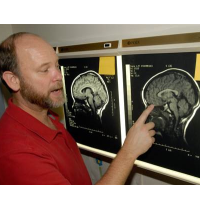Harvard Report Suggests Raising Age for Juvenile Justice to 21, Partly because Human Brain Doesn’t Fully Mature until mid-20s
 Teenager brain scan reviewed by Dr. Jay Giedd at the National Institute of Health (photo: Stephen J. Boitano, AP)
Teenager brain scan reviewed by Dr. Jay Giedd at the National Institute of Health (photo: Stephen J. Boitano, AP)
Research has found that young people’s brains aren’t fully developed until they’re in their 20s. Why then does the criminal justice system assume that 18-year-olds, and sometimes much younger children, should be fully responsible for their actions?
A report from the Harvard Kennedy School and the National Institute of Justice says that those up to age 21 should be treated as juveniles by the justice system, with gradually diminishing protections for those up to age 24.
“Such a system recognizes the diminished capacity for responsible decision-making in youth while harnessing the opportunities presented by their ability to grow, adapt and change. Additionally, such a system would recognize the diminished opportunities and greater demands that now face young adults, particularly in the disadvantaged communities that supply the adult correctional system,” according to the report (pdf) by Vincent Schiraldi, Bruce Western and Kendra Bradner.
This system would buck the trend of treating children suspected of committing particularly brutal crimes as adults. In 2009, a Pennsylvania boy, Jordan Brown, was initially moved into the adult justice system at age 11 when he was suspected of the murder of his father’s pregnant fiancée. He faced life without parole before eventually being tried as a juvenile. Contesting the evidence used to convict him, he appealed his sentence and now might get a new trial.
The report offers an example of a probation program in San Francisco in which those 18 to 25 are put into a Transitional Age Youth unit, which has special programs. The unit claims a 73% successful completion rate.
The report’s authors also recommend that when all else has failed and young people must be incarcerated, “youth discounts” that would cut their sentences should be considered. Younger offenders should also be put in specialized housing with access to educational, work experience and behavioral-modification programs. “In our model, incarceration is used sparingly, and community organizations are enlisted as partners to promote the social integration of criminally involved young men and women,” the authors wrote.
-Steve Straehley
To Learn More:
Community-Based Responses to Justice-Involved Young Adults (Harvard Kennedy School)
Community-Based Responses to Justice-Involved Young Adults (by Vincent Schiraldi, Bruce Western and Kendra Bradner, New Thinking in Community Corrections) (pdf)
Pa. Boy Convicted of Murder at Age 11 May Get New Trial (by Stephanie Slifer, CBS News)
- Top Stories
- Unusual News
- Where is the Money Going?
- Controversies
- U.S. and the World
- Appointments and Resignations
- Latest News
- Trump to Stop Deportations If…
- Trump Denounces World Series
- What If China Invaded the United States?
- Donald Trump Has a Mental Health Problem and It Has a Name
- Trump Goes on Renaming Frenzy






Comments